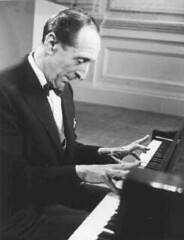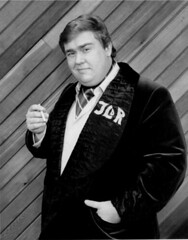(Don't miss the rock-and-roll bonus blog below!)
I am in great debt to Pytor Ilyich Tchaikovsky, which is an odd statement about a composer dead for 110 years, and also considering I failed music from first grade onward.
One of Tchaikovsky's most famous works is his Piano Concerto No. 1. I've been thinking about this for a few weeks now, as Wife and I recently went to hear it performed (it rocked! and I don’t want to hear from you snobs and musicians that it’s an overrated, overplayed Romantic warhorse based on bombast and treacle. I don’t care what you think. You pompous ass! I challenge you to a duel!)
The concerto actually played role in my courtship of Wife. She called me one afternoon when we were dating, and I heard music playing in the background. I identified it as Tchaikovsky's First Piano Concerto — she was duly impressed.
Needs a hand
But Mr. Tchaikovsky — or, as us connoisseurs say, "Chuck Kovsky" — also has improved my writing, or at least my mental state about the whole enterprise. How, you wonder? It starts with my favorite recording of the piece. Which is, hands down, is a benefit concert Vladimir Horowitz gave at Carnegie Hall in 1942 to help the war effort.
Something was in the air that day, because Horowitz tore through the concerto at about 10 times the speed at which I had ever heard it before. What amazes me is despite how fast he played, you can hear every note. It was the first recording by Horowitz I owned, and I’ve been hooked ever since.
To hear Horowitz play what became his signature piece — Rachmaninoff's Third Piano Concerto, the pianist's equivalent of bowling a perfect game six times in a row — one is consumed with a single thought: The guy cut a deal with the devil. Horowitz plays Rachmaninoff with the same ease as the thought "I like money, sex and food" passes through my mind.
Playing a recital, in particular, must be one of the most difficult performance challenges in the world. You mess up on the field, you have teammates who can help you. You miss an overhead volley, there's other points to be played. You're Keith Richards, mess up a few chords, and everybody thinks you did it on purpose.
But when you're playing a concert, you’re expected to play flawlessly, every time. One assumes that a pianist of Horowitz’s stature must have been made of Olympian demeanor, possessed supreme self-confidence, and was constitutionally incapable of harboring one shred of self-doubt.
But Horowitz’s exterior did not match the demons within, as he suffered from depression and questioned his sexuality. Those things don't surprise me. This is nothing new in the world of artists, performing or otherwise (for those of you bored but who have bothered to read this far, think of Axel Rose, Kurt Cobain, and Jim Morrison).
What amazes me, what I find hard to fathom, is the man lost confidence in himself. There were long stretches of his life when Horowitz just gave up concerts completely, giving either recitals or nothing at all. He thought he’d lost it.
But not even that is the factor that ties Tchaikovsky to Horowitz to my writing. There were times when Horowitz was so unsure of himself, so scared of failure, that he had to be pushed on stage. I imagine that this is not as uncommon as I would like to believe — especially when it comes to actors, say, I dunno, George Clooney — but Horowitz was not just any pianist. Vladimir Horowitz is considered among the two or three best — perhaps the very best — pianist of the 20th Century.
The thought that dear Vlad doubted his ability to play is like Shakespeare thinking he can't rhyme words. It is like Ella Fitzgerald doubting her ability to sing or like Albert Einstein losing confidence in his ability to do calculus. Think of Tiger Woods quitting golf because the thought that if he went up to the tee and swung, he'd miss the ball completely.
Now, anybody who knows me will say that besides being an idiot, I suffer periodic pangs of self-doubt, as writers have done since Bordis the Caveman took a hammer and blunt instrument and carved the first novel into stone (and what a debut it was! "Astonishing!" the blurbs said, then Bordis' promising career was ended prematurely by a wooly mammoth). My luck of late has leaned towards the ridiculous and hardly sublime, and at times I just think, maybe I don't have the chops.
It is then that I think of Horowitz. I inevitably conjure an image of a bouncer throwing him on stage. There is no sure place on the precipice of art, no matter how talented you are. And if Horowitz thought he played the piano like a blind amputee, then I guess there’s room for my own self-doubt once in a while, even if it’s bullshit.
Monday, March 06, 2006
Tchaikovsky, Horowitz, and Me
Subscribe to:
Comment Feed (RSS)


|